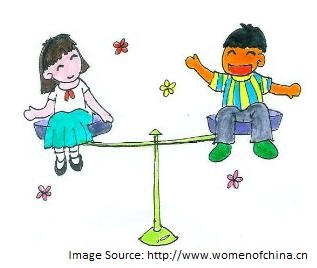5 Parenting Tips to Raise Gender-Equal Children

Pulkit Bhasin is currently in 11th grade. He thoroughly enjoys reading, writing, and playing cricket. He has volunteered at other organizations as well where he has taken up a plethora of roles from database management to teaching underprivileged children. He relishes the opportunity of public speaking and has participated in various debating competitions. He holds some experience in computer programming as well.
5 Parenting Tips to Raise Gender-Equal Children
Teaching begins at home. Children between the age of 7 and 9 are in their developing years and tend to pick up on things from their surroundings very quickly. Hence, it is crucial for parents and teachers to consciously maintain an inclusive environment at home and teach children to do the same. This article will show you 5 things you must follow in front of your children for their long-term maturity and development.
1) Always use gender-neutral terms
Avoid using gender specific pronouns such as he and she to refer to individuals. It is important to teach children that their gender does not represent their identity. While these habits may seem harmless and insignificant at first, their effect becomes more prominent in later stages of an individual’s life, as language begins to enable one to categorize the world and incorporate personal assumptions, social norms, and cultural ideologies. Furthermore, common terms in the English language lean towards the masculine gender. Terms such as chairman, salesman, and policeman often imply that certain professions are limited to men. It is time we break this social construct and introduce a language that accommodates both genders. Replace ‘he’ and ‘she’ with ‘they’ and ‘man’ with ‘person’ and your children will pick up the same habits!
2) Ensure that all your children get identical opportunities
As a parent, we often tend to push our children towards different fields. Young girls are made to join art classes and boys for cricket or football coaching. Boys must wear blue, and girls must wear pink. Such occurrences often sow the seeds of a gender gap within youngsters’ minds, as they begin to believe that each gender is suited to different roles. This must stop! Young girls and boys should be given the opportunity to explore each and every field and choose their interests according to what drives them rather than what society finds acceptable for them. This way each individual would be able to find their identity and express themselves more effectively at later stages of their lives. It’ll further help them to grow into respectful individuals who are comfortable with others’ decisions.
3) Respect your child’s feelings
Our society often expects different genders to behave a certain way. Boys are expected to put up a tough exterior and suppress their inner emotions whereas girls are encouraged to put on a timid exterior. This affects their emotional development in the long run, as boys feel the need to define themselves as the dominant gender, and girls are always taught to submit to the former. We must take a step forward to bridge our society. Listen to your children. Allow them to speak. Let them find their voice themselves. It’s time we stop instructing children how to behave and let them grow into individuals they wish to be. Boys can cry. Girls can play sports. Let’s break all stereotypes.
4) Talk to your children
The most important aspect is to ensure transparency between you and your child. Talk to them. Make sure they’re aware of the line between right and wrong. The stigma of talking about certain topics in our society often means that children receive minimal information regarding how they should conduct themselves, which reflects in their behavior later on. Teach children about consent. Teach them how to identify between appropriate and inappropriate conduct. Teach them the importance of sex education. We’re not doing our children any favors by avoiding the conversations because it’ll lead to them gaining half of the required information from unreliable sources that’ll lead to the development of misinformed individuals.
5) Assign them similar chores
Parents must ensure that all of their children feel equal at home. Girls and boys must be assigned similar chores- they must wash dishes; mow the lawn; learn how to wash the dishes. This ensures that individuals go on to have equal relationships in the future, as they see each other as equal beings, which all carry out the same tasks and share the same purpose. It’ll further allow youngsters to grow up into men and women, who can work together harmoniously and efficiently, eradicating gender-based discrimination from the workplace.
Opinions are of the writer.


